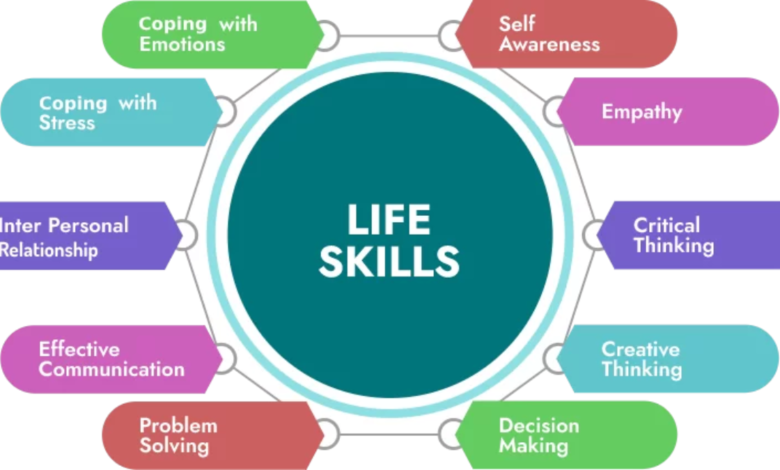Life Skills: Essential Tools for Thriving in the Real World

When it comes to navigating the twists and turns of everyday life, mastering life skills is essential. These skills are practical abilities that help individuals handle challenges, make decisions, and live independently. Whether it’s learning how to communicate effectively or managing time wisely, life skills empower us to succeed in personal, social, and professional spheres.
In this article, we’ll explore the most important life skills you need to develop, why they matter, and how to build them. Let’s dive in and unlock the secrets to living a balanced, productive, and fulfilling life!
What Are Life Skills?

Life skills are abilities that help individuals manage their personal lives, relationships, and responsibilities. They cover a wide range of areas, including problem-solving, communication, time management, and emotional regulation. The beauty of life skills is that they aren’t limited to the classroom—anyone can develop them at any stage of life.
These skills allow us to adapt to change, overcome obstacles, and make thoughtful decisions in real-life situations. They help people manage emotions, interact socially, and stay focused on goals, which makes them vital for both personal growth and career success.
Core Life Skills Everyone Should Master
To thrive in a fast-paced world, there are certain skills that everyone needs to develop. These core abilities act as the foundation for both personal and professional growth.
- Communication Skills: Being able to express thoughts clearly and listen actively is key to building relationships.
- Problem-Solving Skills: Life throws challenges our way, and knowing how to think critically helps us tackle them effectively.
- Decision-Making Skills: Good decisions come from analyzing situations and considering potential outcomes.
- Time Management: Learning how to prioritize tasks and avoid procrastination helps boost productivity.
- Emotional Intelligence: Understanding and managing emotions is essential for both mental well-being and social harmony.
Why Life Skills Are Important
Having a strong set of life skills provides several advantages that extend across every area of life. These abilities are not just “nice to have” but critical for personal and professional development.
- Independence: With life , people become self-sufficient, managing their finances, schedules, and emotions.
- Stronger Relationships: Effective communication and empathy build meaningful connections with others.
- Better Career Opportunities: Many employers value life skills such as teamwork, problem-solving, and adaptability.
- Mental Well-being: Learning to manage stress, regulate emotions, and maintain a positive mindset fosters good mental health.
Life Skills for Students: Preparing for Adulthood
Students benefit greatly from learning , as these abilities prepare them for life beyond school. Transitioning to adulthood involves more than just academic success—knowing how to handle responsibilities is equally important.
Key Life Skills for Students
- Financial Literacy: Understanding how to budget, save, and spend wisely ensures financial stability.
- Critical Thinking: This skill helps students evaluate information, solve problems, and make informed decisions.
- Self-Care: Learning to balance work, rest, and recreation promotes physical and emotional well-being.
- Collaboration: Working in groups builds teamwork and prepares students for professional environments.
By developing these skills early, students are better equipped to handle the pressures of adult life and seize opportunities.
Life Skills for the Workplace
Employers increasingly seek candidates who possess strong skills. Technical knowledge alone isn’t enough—employees must also demonstrate adaptability, teamwork, and effective communication.
Essential Workplace Life
- Teamwork and Collaboration: Working well with others improves productivity and strengthens workplace culture.
- Adaptability: Being open to change and learning new skills is crucial in today’s evolving job market.
- Conflict Resolution: Knowing how to manage disagreements calmly leads to smoother interactions.
- Leadership: Effective leaders inspire others and guide teams toward achieving shared goals.
Having these skills boosts career prospects and makes individuals more valuable in any professional setting.
Table: Comparison of Soft Skills vs. Hard Skills
AspectSoft Skills (Life Skills)Hard Skills
Definition Personal attributes and interpersonal skills Technical knowledge or job-specific abilities
Examples Communication, teamwork, adaptability Programming, data analysis, accounting
Application Useful in every aspect of life Often specific to certain careers
Measurement Hard to measure but visible through behavior Measurable through tests or certifications
Building Life Skills Through Daily Habits
Developing life skills doesn’t require special classes—it’s a continuous process that can happen through everyday activities. Here are a few habits that can help you sharpen these skills:
- Journaling: Writing down your thoughts helps improve emotional awareness and encourages reflection.
- Reading Daily: Reading expands your knowledge and strengthens critical thinking.
- Setting Goals: Create achievable short-term and long-term goals to build discipline and motivation.
- Practicing Gratitude: Cultivating gratitude fosters a positive mindset and strengthens emotional resilience.
These small habits, when practiced consistently, lead to noticeable improvements over time.
How Parents Can Teach Life Skills to Children
Parents play a key role in teaching life skills to children. From a young age, kids can start learning practical skills that help them grow into capable adults.
Ways to Teach Life Skills at Home
- Assign Chores: Giving children age-appropriate tasks fosters responsibility and independence.
- Teach Money Management: Introduce concepts like saving and spending to build financial literacy early on.
- Encourage Social Interaction: Letting kids engage with peers develops communication and empathy.
- Model Positive Behavior: Children learn by example, so parents should demonstrate the behaviors they wish to instill.
Through patience and consistent guidance, parents can raise confident, self-reliant children who are prepared for the future.
Overcoming Barriers to Developing Life Skills
While developing life skills is important, it’s not always easy. Many individuals face barriers that can slow their progress, such as fear of failure or lack of opportunities.
Tips for Overcoming These Barriers
- Start Small: Begin with one skill at a time instead of trying to master everything at once.
- Seek Feedback: Constructive criticism from others helps you improve.
- Embrace Failure: Treat mistakes as learning opportunities rather than setbacks.
- Find Role Models: Look up to people who demonstrate the life skills you admire and learn from their behavior.
With persistence and the right mindset, anyone can overcome these obstacles and grow their skill set.
Final Thoughts on Life Skills
Mastering life skills is an ongoing journey, and there’s always room for improvement. These abilities form the backbone of personal growth and career success, allowing individuals to handle life’s ups and downs with confidence. Whether it’s managing your time effectively, resolving conflicts at work, or nurturing meaningful relationships, life skills make all the difference.
The best part? It’s never too late to start developing these skills. With effort and consistency, you can build the habits and abilities that will serve you well throughout your life. So, keep learning, stay curious, and embrace the process of self-improvement—because life skills are the key to a fulfilling and successful life!



